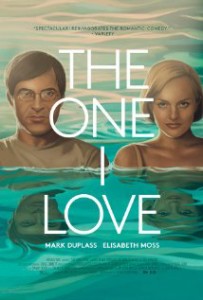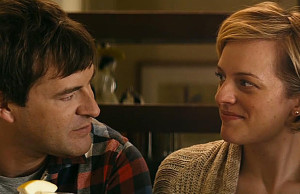 It’s hard to find a good love story these days. Modern choices either give us the sugary sweet Rom-Com or the overtly sexualized fantasy. Relationships don’t get a lot of truthful representation in films right now. But The One I Love, an under the radar indie film from last year, uses a unique convention to give us a pretty good example of a common relationship situation.
It’s hard to find a good love story these days. Modern choices either give us the sugary sweet Rom-Com or the overtly sexualized fantasy. Relationships don’t get a lot of truthful representation in films right now. But The One I Love, an under the radar indie film from last year, uses a unique convention to give us a pretty good example of a common relationship situation.
The (spoiler free) summation of the film is: after receiving advice from their new marriage counselor, Ethan (Mark Duplass) and Sophie (Elisabeth Moss) retreat to a serene getaway home in an attempt to save their dying marriage. But out back on the property there is a guesthouse with unexpected guests- themselves. Or rather, the ideal versions of themselves who can only be seen by the opposite party- Sophie meets an idealize Ethan and vice versa.
The concept is refreshing and inventive. It isn’t a perfect film by any means, but I certainly found myself surprised at many turns, something I honestly haven’t experience in a film in some time. And though it is a simple subject that the film examines, it is an essential one to who we are and how we treat one another.
If you have ever told someone that you love them, did you ever consider who you were actually telling it to? Was it your significant other, or was it a representation of that person? The lines can get blurry very quickly, and in the film we see what it could look like if such a representation magically came to life.
The idea of magic is essential to the film. In the first lines of dialogue Ethan calls the moment the two of them met magical. So from the beginning we have a set up for a story that is all about trying to get back to or live up to that moment. Ethan and Sophie spend great effort to remake their relationship what it once was when they considered it magical. At one point they even attempt to relive the night they met.
It begs the question- why is progress so often the enemy of love? While there isn’t a true answer, the path to finding one is wrapped up in our identities.
 Unlike Ethan and Sophie, we don’t get to see a real life display of our idealistic view of our relationship partners. But without a doubt we do create one. The idea of being vulnerable to another person is essential to being truly loved; yet it is scary, intimidating. With flaws exposed, we can feel the need to pull back and put up our guard. If we then project how we hope to be viewed onto the other person, seeing anything else becomes difficult to accept, as Ethan and Sophie discover.
Unlike Ethan and Sophie, we don’t get to see a real life display of our idealistic view of our relationship partners. But without a doubt we do create one. The idea of being vulnerable to another person is essential to being truly loved; yet it is scary, intimidating. With flaws exposed, we can feel the need to pull back and put up our guard. If we then project how we hope to be viewed onto the other person, seeing anything else becomes difficult to accept, as Ethan and Sophie discover.
But if we had a choice between the two versions, which one would we choose? The central conflict of the film resides in this choice. As the two discover what is really going on, they are forced into deciding how they will continue with their lives after the retreat is over.
We all have an inherent desire to give love to that “perfect one.” We are completely incapable of living up to that standard ourselves yet we hope in others to be exactly that. It is why human relationships ultimately let us down. The film gives stark life to this conflict. And it makes it believable primarily due to the superb acting of the two leads- Mark Duplass and Elisabeth Moss. It is a fascinating example of being let down as we reach for something as an ultimate that can never be.

